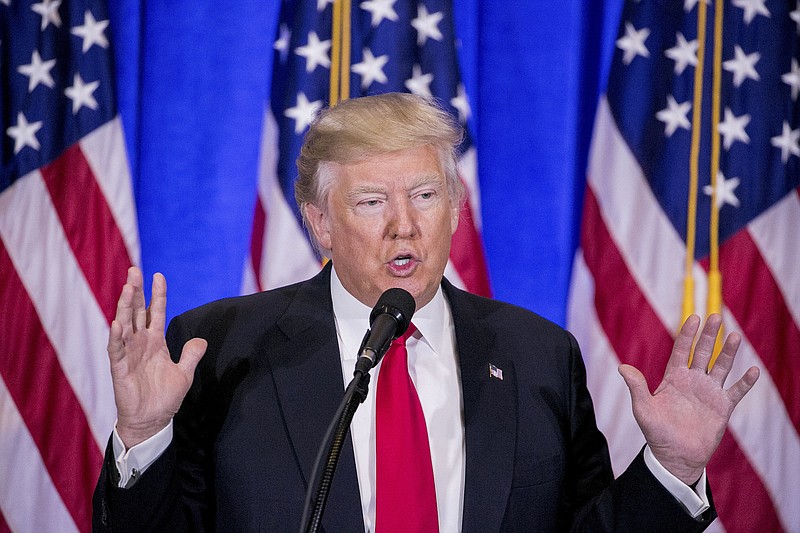President Donald Trump was elected in 2016 partly on a promise to build a Southern border wall to combat the relatively unchecked flow of illegal immigrants into the country and make Mexico pay for the wall.
The flow of illegal immigrants into the country only has gotten worse, and our neighbor to the South has not ponied up any money for a wall.
That could change with Trump's announcement late Thursday that he is slapping gradually increasing tariffs on goods coming in from Mexico until the country tries to stanch the flow of bodies into the U.S.
While the tariffs wouldn't directly pay for a wall, they could indirectly help pay for it.
Mexico has been notoriously unhelpful in keeping groups of illegal immigrants from passing through the country from Central America en route to the U.S.
Trump should be able to look for cooperation from Democrats on immigration matters, but his surprise election two-plus years ago - and their bitterness over it - has caused them to turn a blind eye from the Southern border. Indeed, they have said there is no crisis at the border. But consider this:
* U.S. immigration courts that process asylum claims currently have a backlog of more than 800,000 cases.
* Customs and Border Protection apprehended or turned away more than 109,000 migrants attempting to cross the border in April.
* Border agents made more than 100,000 arrests or denials of entry in March, a 12-year high.
* More than 1,000 illegal immigrants were caught by border agents on Wednesday, the largest ever such group apprehended at a single time.
* More families illegally crossed the border between October 2018 and February 2019 than during all of fiscal 2018, which ran between Oct. 1, 2017, and Sept. 30, 2018.
Trump, quite naturally, is fed up with waiting for cooperation from Democrats, with Democrat-appointed judges siding against him in the quite illegal flow of immigrants, and with Mexico and other Central American countries doing little to work with the U.S. on the problem.
The president's plan is bold and, if not blocked in some way by judges, could have immediate consequences.
The tariffs will begin at 5% on June 10 on all goods coming in by land, sea or air from Mexico, increase to 10% on July 1, jump to 15% on August 1, climb to 20% on Sept. 1 and move to 25% on Oct. 1.
They would remain at 25%, Trump said, "unless and until Mexico substantially stops the illegal inflow of aliens coming through its territory."
"Mexico's passive cooperation in allowing this mass incursion," he said, "constitutes an emergency and extraordinary threat to the national security and economy of the United States."
A 1977 law, the International Emergency Economic Powers Act, allows tariffs to be levied by the president in the event of a national emergency originating from a foreign source.
To our understanding, Trump's plan fits the bill, but open borders advocates are likely to look for a Democrat-appointed judge to disagree.
Mexico could cooperate, according to the White House, by working with the U.S. on a workable asylum policy, by increasing security efforts at the border, by targeting transnational smugglers and by cracking down on illicit bus lines.
The country could sharply decrease the flow, according to the administration, by using certain "choke points" at the border.
We admire Trump's desire to do something immediate and something that has the potential to make a difference in Mexico's behavior. We hope, though, it's for a very short time.
However, in what certainly seemed an ill-timed coincidence, the Trump White House sent the United States-Mexico-Canada agreement, which aims to limit tariffs among the three countries, to Congress earlier Thursday. The agreement, replacing the North American Free Trade Agreement, was signed in November but must be ratified by Congress.
The U.S. recently lifted steel and aluminum tariffs on Canada that had threatened the agreement, and Vice President Mike Pence was in Canada's capital, Ottawa, on Thursday to push for its support.
So, business leaders and even some Republicans decried Trump's new moves to impose the tariffs. Among those, Volkswagen, of which Chattanooga is the home to its U.S. manufacturing plant, said the significant long-term investments it has made in the U.S "would be impaired by restrictive changes to trade."
However, VW said it hopes the issue will be resolve "through constructive negotiations without the imposition of tariffs."
We hope Mexico will consider the pain U.S. sanctions have had on other countries and decide high tariffs could be just as devastating. Our Southern neighbor unquestionably could be doing more to stop the flow of illegal immigrants into the U.S., and we hope the potential pain the tariffs would bring forces it to ramp up what it can do.
